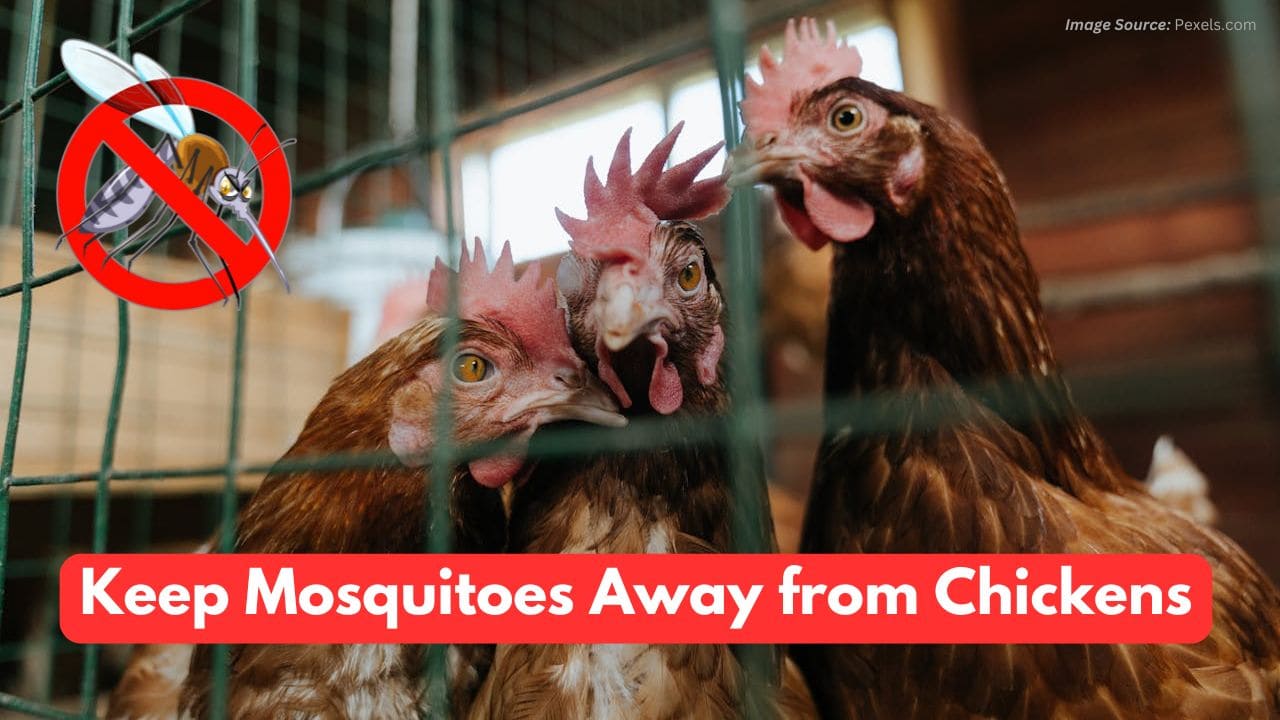Table of Contents
Chickens although have thick feathers but still get mosquito bites on exposed areas like combs and wattles. These mosquitoes can be extremely frustrating and bothersome for your chickens. They not only cause discomfort but can also transfer dreadful diseases, that is highly dangerous for your flock’s health.
Why it is necessary to keep mosquitoes away from chickens
Mosquitoes can transmit diseases to your chickens by transferring pathogens and viruses that severely affects the health of your chickens, reduces egg production and in severe cases can also lead to death. Thus, it is important to keep mosquitoes away from chickens.
Chickens are highly active in day time but once they enter their coops for rest in the evening, they find difficult to defend themselves against the buzzing insects irritating every second. Also, in evening the swarm or flood of mosquitoes find their way and attacks these innocent birds. This causes continuous agitation of chickens to fight against the pests.
But they are not humans and easily lose their defense leading to multiple mosquito bites, thus causing stress and sleepless nights, physical stress, weight loss and reduced egg production.
How chickens interact with mosquitoes and do they really eat mosquitoes?
- Yes, chickens do eat mosquitoes but they can’t control their populations. They are good at catching insects that crawl on grounds like ticks, crickets grasshoppers, etc.; but not hunting on flying insects from mid air. There are myths that chickens do eat snakes and mice also, but this is not true and maybe in some exceptional cases, due to excess hunger or an excitement for mesmerizing taste buds, the chickens would have tried.
- In some research studies it has been found that malaria carrying species of mosquitoes (anopheles) stay away from the chickens, due to the odor of volatile compounds from chickens which acts as a repellent.
- Severe infestations however, will definitely cause health issues in chickens. Therefore, we should keep the chickens and chicken coop well protected from mosquitoes.
How to reduce mosquito infestation in chicken coops
You need to take certain actions to reduce the population and growth of mosquitoes first, and then the remaining ones can be repelled off using mosquito repellents, traps and insecticides. Take following actions to get rid of mosquitoes away from chicken coop:
1. Clean the yard around the chicken coop
Clean the yard surrounding the coop and make it tidy. Remove all unnecessary stuff lying around the coop. Remove empty feed packages, broken containers, wooden plies, cardboard boxes, trash, tools, etc. Nothing should be kept unnecessary that can hold any amount of water. Declutter each and every corner around the chicken coop.
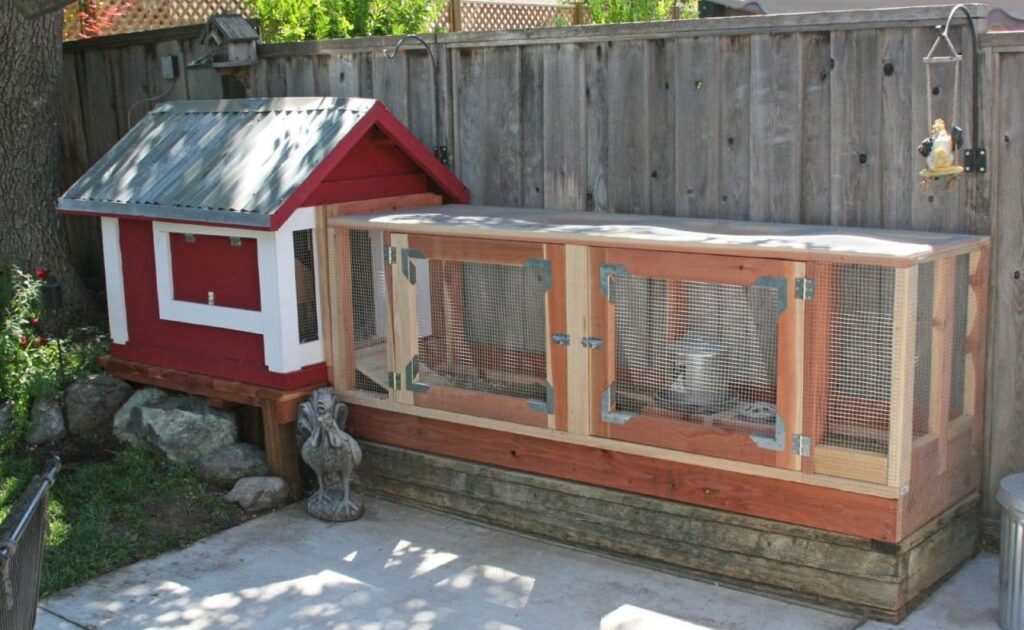
Image Credit: Flickr, Alan Hack | Creative Commons License
2. Remove any stagnant water
Mosquitoes generally lay eggs in standing waters, like uncovered water tanks, water jars, puddles, bird baths, leakage water pooling, etc. This source of standing water can be responsible for breeding of thousands of mosquitoes. You should check within coop and surrounding areas and eliminate any standing waters.
3. Clean the coop regularly for spilled feeder waste
Watering system for chickens should be checked for any leakage or overflow. The coop should remain clean and dry most of the time otherwise it may invite mosquitoes. All kinds of chicken waterers like bowl or water lane for chickens should be clean daily to avoid mosquitoes infestation. The feeder should also be kept clean otherwise the spilled feed get spoil over time and may invite insects and pests including mosquitoes.
4. Control humidity through proper ventilation
Ventilation is very important as mosquitoes thrive in humid conditions. Proper ventilation through vents and windows will help in controlling humidity inside the coop. Install vents and fans to keep the air circulation required which helps in dispersing the carbon dioxide and heat released by chickens, through exhaust.
5. Don’t overcrowd the coop with chickens
Don’t overcrowd chicken pens as it may increase the heat and humidity inside, and accelerate the stress in chickens. Also, there must be enough space for the chickens to move around. Overcrowded pens are somewhat more difficult to clean, and it may get dirtier soon due to more number of chickens.
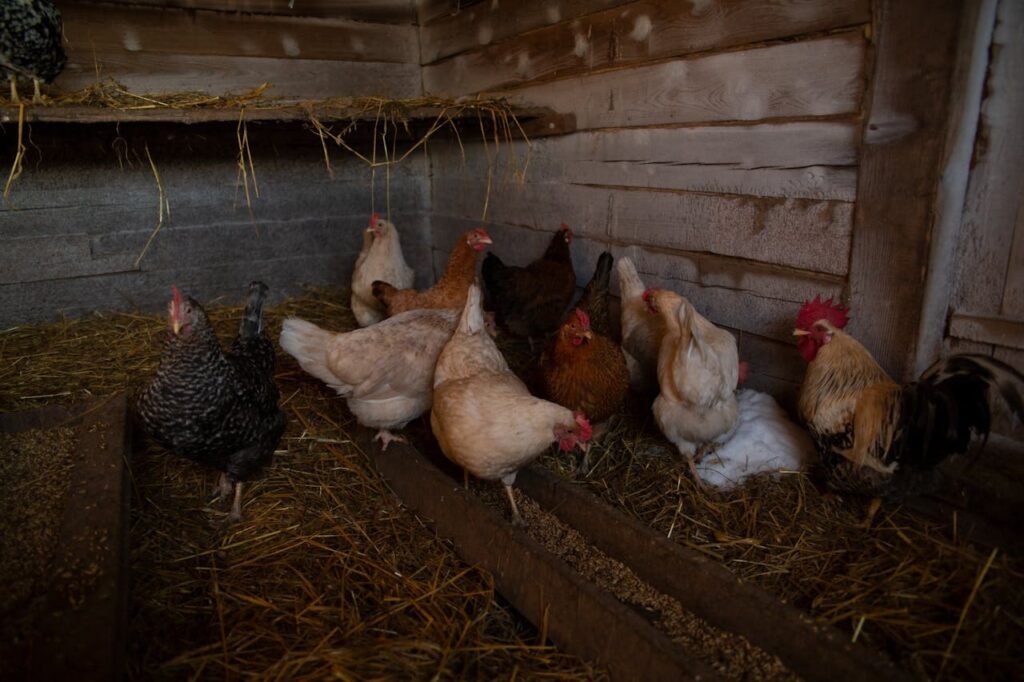
Image Credit: Pexels, Ivan Babydov | Content License
6. Install mosquito screens and nets
Placing physical barriers like mosquito screens on vents, windows and doors will keep mosquitoes away, while providing ventilation at the same time.
Mosquito nets can also be draped on coops and pens in evening times when mosquitoes are most active. This will assure complete chicken safety and protection from mosquitoes.
7. Check for any cracks and gaps
Seal all the gaps and entry points other than windows and vents, through which all kinds of pests can be restricted for entering the coop. You can use chalk, cement or fillers to fill the cracks and gaps.
8. Clean clogged drainage and gutters around the coop
Any faulty water connections, leaking tanks and pipe lines, clogged drainage and jammed gutters, can create standing water which can be a breeding site for mosquitoes. Filthy and foul smell from drainage and gutters, which releases carbon dioxide through decomposition of waste and garbage attracts mosquitoes.
Using natural mosquito repellents for chicken coops
1. Mosquito repelling herbs and plants around the chicken pen
Lemon Grass: Lemon grass has rich source of citronella which is a well known mosquito repellent. It creates a barrier against the scents that attracts mosquitoes.
Lavender: lavender has a fresh soothing scent that is not attractive to mosquitoes. Place lavender plants near the coop entrances or plant them around the coop.
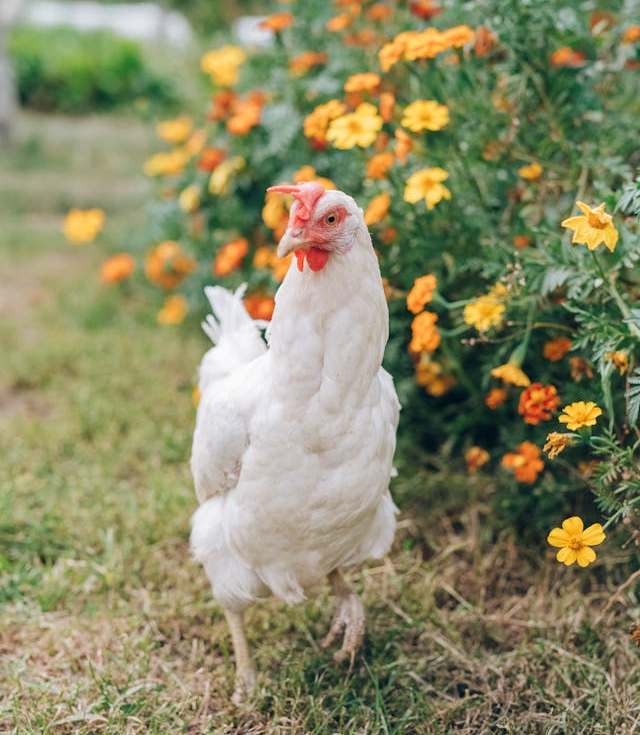
Image Credit: Pexels, Leeloo The First | Content License
Basil: Plant basil pots near the coop. This basil plant herbs can also be used in cooking and has got multiple benefits, apart from mosquito repelling properties.
Marigold: Marigold contains pyrethrum which is a natural insect repellent. Plant marigold flowers around the coop, to keep mosquitoes away from chicken pen.
Garlic: Plant garlic around the chicken coop to repel mosquitoes away. The strong pungent odor of garlic deters mosquitoes away for a longer time..
Nasturtium: Nasturtium also has insect repelling properties and they can also help in stimulating egg laying process in chickens, and also protect chickens from becoming egg-bound.
Bundle of herbs: Hang bundle of dried aromatic herbs like catnip, thyme, bee balm, lavender, rosemary, lemon grass, etc. inside the coop. Or create a garden at the perimeter of the coop by planting these mosquito repelling plants and herbs.
Cinnamon: Cinnamon powder can be sprinkled around the coop to deter mosquitoes away from coop.
Clove with Citrus: Cloves inserted in lemon or oranges, and hanged inside the coop can also add extra layer of protection against mosquitoes. This also gives a refreshing scent inside the coop area.
All the above natural mosquito repellent for chicken coop, does not give 100% protection. These are safe and sound methods, and their effectiveness can be improved by using in combination.
2. Using essential oils
Citronella oil: Mix citronella oil with water and spray in the areas where mosquitoes gather or at entry points, around the coop.
Eucalyptus oil: In a similar way, mix it with water and spray around near the entry points to restrict most of them.
Lavender oil: this can be added to waters for cleaning purposes. This will give a refreshing scent after the cleaning of coop.
Use it sparingly, and do not spray directly on chickens as higher or concentrated amounts of these oils can be harmful for chickens.
3. Using smoke by burning natural herbs
Smoke causes confusion among mosquitoes and disrupts their olfactory senses. And the burning of mosquito repelling herbs in fire pits, creates a barrier because of which they can’t detect hosts. Though it is a very simple and effective way but can’t be used daily overnight. Also, continuous uncontrolled smoke can create discomfort among chickens.
Using synthetic methods to repel mosquitoes away from chicken coops
1. Using mosquito traps
UV based mosquito traps are very common and effective as they attract mosquitoes with UV light, and then either traps them or killed them with electric current shock. Place them in regions where mosquitoes are high in numbers.
CO2 traps works by continuously emitting carbon dioxide and mimics the presence of a host. This attracts mosquitoes and trap them inside or kill them.
Place these mosquito traps at some distance from the coop to keep the chickens safe by luring the mosquitoes away.
2. Using larvicides for standing water
There are certain sources of standing water which cannot be eliminated like, pond, bird baths, water troughs, fountain, pool, etc. At such places you can use larvicides to prevent mosquito breeding.
BTI (Bacillus Thuringiensis Israelensis): This is a naturally occurring bacterium which targets mosquito larvae only, and does not harm other animals and your chicken.
Methoprene: It disrupts the growth process of mosquito larvae and prevent them from becoming adult mosquitoes. It works as an insect growth regulator. it is also safe to use around chickens and other animals.
Follow product usage instructions while using, and reapply as necessary to get the desired results.
You can also use golden fish in standing waters like pool and ponds, which feeds on larvae.
3. Using insecticides
When situation is getting worse and no methods are effective enough, you can make use of insecticides. However, it is very important to check which insecticide is safe for chickens.
Permethrin: This is mostly used in agricultural sector, and is safe for chickens. But for safer side, always check manufacturers usage guide and instructions before applying in bulk.
Pyrethrin: These are also quiet effective against mosquitoes, and can be safely used around chicken pens and poultry farms.
Important Tip: Use or spray insecticides inside coop only when chickens are not present inside. And allow the coop area to get proper ventilation before bringing the chickens back to the coop.
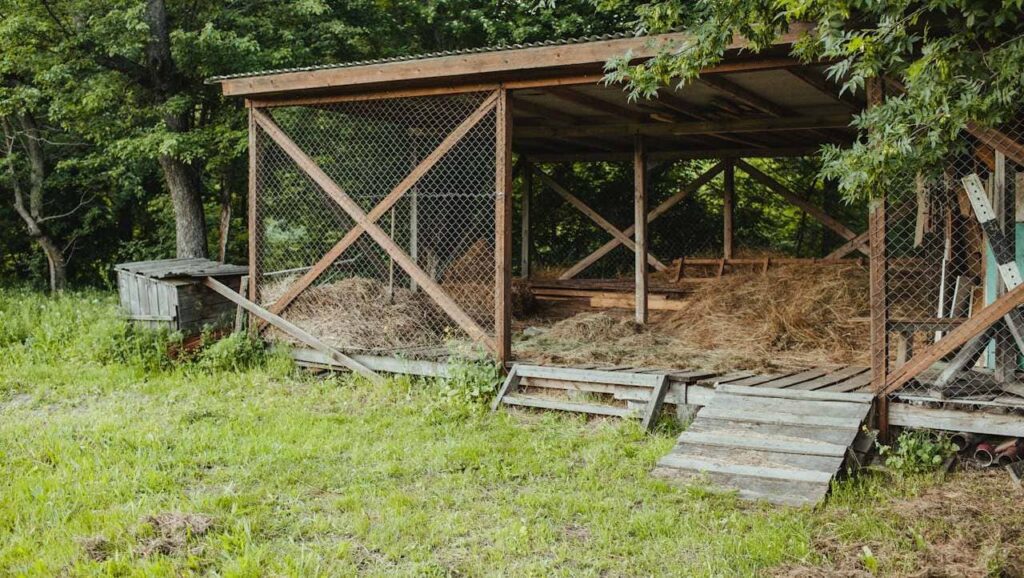
Image Credit: Pexels, Roman Serezhechkin | Content License
4. Natural predators that feed on mosquitoes
Make the environment around the coop favorable for certain natural predators that feed on mosquitoes. These predators can naturally reduce mosquito population to some extent, without the use of any repelling agents.
Certain birds like swallows and purple martins feed on mosquitoes. Installing birdhouses, birdbaths and bird feeders can attract these birds. Bats are also known for controlling mosquito population, so you can also consider installing a bat house near the coop.
Dragonflies which are well known as mosquito hawks, as they prey on mosquitoes. Creating a diverse environment that attracts dragonflies will bring down the population of mosquitoes around.
DIY Mosquito Repellent Spray for Chicken Coops
1. Citronella Spray
- 5ml of Citronella essential oil
- 4 Cups of water
- 4 tablespoon of alcohol
- 1 large Spray bottle
Preparation:
- Take 4 cups of water into the spray bottle
- Add Citronella essential oil
- To help the oil get mix in water, add alcohol or witch hazel
- Shake well to mix the ingredients well.
- Always use in controlled amounts, in absence of chickens. Avoid direct contact with chickens and their food and water.
2. Lemon Eucalyptus Spray
Ingredients:
- 5ml of Lemon-Eucalyptus essential oil
- 4 Cups of water
- 4 tablespoon of alcohol
- 1 large Spray bottle
Preparation:
- Take 4 cups of water into the spray bottle
- Add lemon-eucalyptus essential oil
- To help the oil get mix in water, add alcohol or witch hazel
- Shake well to mix the ingredients well.
3. Garlic Spray
Ingredients:
- Take 8 to 10 cloves of garlic
- 4 tablespoons of mineral oil
- 2 teaspoon of mild liquid soap
- 1 large Spray bottle
Preparation:
- Crush the garlic cloves in a bowl to release the allicin which is the active ingredient.
- Pour the mineral oil over the crushed garlic, mix well. This allicin gets released and mixed into the mineral oil. Allow the mixture to sit for 24 hrs, so that the garlic gets completely infused into the oil.
- Strain the mixture after 24 hrs.
- Transfer this mixture in the spray bottle, and add 4 cups of water to dilute it and than add 4 teaspoon of mild liquid soap, to make up the final solution.
- Shake well before each use.
4. Lavender and Peppermint Spray
Ingredients:
- 5ml of Lavender essential oil
- 5ml drops of Peppermint essential oil
- 4 Cups of water
- 1 large Spray bottle
Preparation:
- Take 4 cups of water in spray bottle and add 5ml of each peppermint and lavender essential oils. Peppermint has a strong menthol scent that mosquitoes don’t like. While the lavender oil soothes and repel insects.
- Shake and mix well
- Spray the mixture around the coops and nesting areas, avoid direct contact with the chickens and their feed/water.
What to avoid while protecting chickens from mosquitoes
Important tips on how to keep mosquitoes away from chickens:
- Avoid using excessive amounts of insecticides, that may contaminate the chicken feed and water.
- Avoid overcrowding in coop, which can result in warm and humid areas which invites mosquitoes.
- There may be some herbs and plants known for mosquito repelling effect but they can be toxic for chickens. Avoid planting such toxic plants. Do your research.
- Avoid frequent visit to the coop in evening or night times, which can create entry points as the population and activity of mosquitoes is higher at this time.
- Never neglect cleanliness. Cleaning in an d around the coop is very important for the protection and well being of your chickens.
- Strong lighting outside the coop in night can also attracts mosquitoes.
- You should not plant dense vegetation or growing plants that are too close as it will create shade and humid areas where mosquitoes will thrive.
- Never ignore inspections as it will make the situation worse and impossible to control later. And your chickens have to suffer till than.
- Never leave the feed and feeding waters uncovered as this may attract other pests as well and they can create environments favorable for mosquito breeding.
- Clear the perimeter around the coop, declutter any debris and trash around. Also cut down tall grass around the coop, where mosquitoes can hide.
- Mosquitoes does not arrive in summers only, they can also attack in warm days in other seasons as well, so be ready.
- Rotate and use the mosquito repellents or else mosquitoes will become insensitive to any particular repellent.
Frequently Asked Questions (FAQs)
-
Why mosquitoes are attracted to chicken coops?
Chicken coops provides favorable environment for mosquitoes as chickens release heat, moisture and carbon dioxide. These provides warm and damp conditions which are ideal for mosquito breeding, and if there is any uncovered water container or stagnant water nearby, the problem can become severe soon.
-
Is mosquito spray safe for chickens?
Many strong mosquito repellent sprays contains harmful and toxic chemicals. This can be harmful if inhaled or consumed. Always check the contents for harmful chemicals and manufacturers labels, if they contain non-toxic chemicals to be used around birds and animals.
-
Is lemongrass safe for chickens?
Yes, lemon grass is safe for chickens. They can consume in moderate amounts without any adverse effect. It is mostly planted around chicken coops to deter mosquitoes away.
-
Can chickens eat citronella plants?
Yes, they can eat Citronella plants. It is safe for them in moderate amounts, but any excess amount of such herbs can upset their digestive system.
-
How to treat mosquito bites on chickens?
To treat mosquito bites on chickens you need to first clean the affected area with warm water and mild antiseptic, in order to prevent spreading of infection. You can also use diluted tea tree oil or aloe vera to soothe irritation. Keep the coop mosquito free to prevent further bites, and monitor the chickens for any further signs of illness.
-
Can chickens get sick from mosquitoes?
Mosquitoes carry large number of viruses and infections, which can easily infect birds and animals. Chickens do also get infected with certain viruses carried and transmitted through mosquitoes. These can make chickens weak, stressed, and reduce their egg-laying capacity. There are viruses which can also turn fatal for chickens if not controlled in time.

